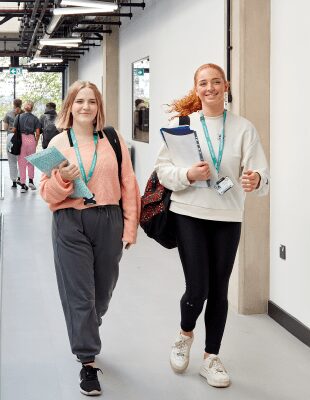Apprenticeships for employers
Apprenticeships are designed around the needs of businesses and can help transform your organisation.
They are fully funded, meaning the employer doesn’t need to contribute towards the training programme, and they provide an opportunity to harness fresh new talent by recruiting a new member of staff, or upskill an existing member of staff. By training an apprentice with Bridgend College, you are helping to develop a pipeline of talent to support your organisation in the future.
An apprentice can:
- Provide opportunities to accelerate business growth
- Improve productivity and reduce business costs
- Nurture talent to improve services
- Give your business a creative boost
Our Apprenticeships
Why work with Bridgend College?
We are an award-winning provider and have been training apprentices for over 90 years. We have helped hundreds of organisations of different sizes and in many different sectors develop their workforce.
- We offer over 35 apprenticeship pathways, from pre-entry to Higher Apprenticeships (Level 4+).
- We are proud to have consistently delivered apprenticeship attainment rates significantly above sector averages.
- We were shortlisted for ‘Apprenticeship Programme of the Year’ in 2019 and 2020 at the Tes FE Awards.
- Bridgend College apprentices won ‘National Apprentice of the Year’ awards across different apprenticeship categories at the Apprenticeship Awards Cymru between 2015 and 2019.
- Regional Winner for Apprenticeship Provider of the Year at the AAC 2018 Awards.
- Our skills tutor, Rachel Lewis, was a finalist for the ‘Work-based Learning Tutor of the Year’ award at the Apprenticeship Awards Cymru in 2019.
Our experienced and supportive team will help you throughout the apprenticeship journey:
- You’ll have a dedicated Work-based Learning Liaison Officer to ensure the apprenticeship programme runs smoothly
- You’ll receive receive regular, detailed feedback on the progress of your apprentice towards each framework component
Next Steps
The organisations we work with are in different stages of their apprenticeship journey – some already have an existing member of staff they’d like to be on an apprenticeship programme while others are keen to recruit a new member of staff to become an apprentice. We are here to support you every step of the way.
We know it’s crucial to find the right fit for your organisation. If you need help recruiting an apprentice, we will discuss your requirements including:
- Exploring your aims and priorities in the type of individual you are looking for.
- Gathering all the necessary information into a job template.
- Discussing a variety of approaches for advertising your vacancies for you, including internally with our own learners, a variety of job websites, social media and reaching out through our extensive network.
- Directing suitable candidates to you who may approach us.
- Helping you connect with individuals by enabling opportunities for you to meet or promote your opportunities to them in person.
If you’d like this support from us, contact our Careers team at Cyfleoedd.
If you have an existing member of staff who you would like to upskill via an apprenticeship, simply complete our online application form. Our Work-based Learning Team will review your application.
If you need any help or support, contact apprenticeship@bridgend.ac.uk or call 01656 302 302 ext 110 or 727
If you know someone who is ready to start their apprenticeship journey with us, contact us today: apprenticeship@bridgend.ac.uk or call 01656 763 233 or 01656 763 238.
Frequently Asked Questions
An apprenticeship combines a job with training. They can be used for anyone, regardless of their experience or age, eg a school leaver or existing member of staff.
Apprenticeships enable individuals to carry out a structured training programme which includes professional qualification(s) and on-the-job training. They equip individuals with the relevant skills, knowledge and behaviours required to carry out a specific job role.
Apprenticeships are a tried and tested way to recruit new staff. They provide an opportunity to develop new talent and upskill existing talent. Employers who recruit apprenticeships often notice a reduction in staff turnover, and an increase in employee loyalty and satisfaction.
Additionally, they can be a cheaper way to recruit staff and can provide the apprentice with the opportunity to progress their skills and develop in their role.
Apprenticeship programmes span from level 2 –7. Levels 6 and 7 are intended to be equivalent to a Bachelor’s and a Master’s Degree.
The duration of an apprenticeship varies depending on the apprenticeship that you choose, and the apprentice you employ. The minimum duration of an apprenticeship is 12 months. Some higher-level or degree-level apprenticeships can run for up to 48 months.
Yes. From April 2017, funding is available to all graduates regardless of their experience or age. The apprenticeship they are using must be significantly different to the qualifications they already hold so that new skills are learned.
Yes, apprentices must be employed in a real job. They are contracted into a role by the employer and required to work a minimum of 30 hours per week.
The apprenticeship contract must stipulate the following: the duration of the apprenticeship, the training provided, the working conditions and the qualifications the apprentice will be working towards. Each apprenticeship will include time to study either in College or in the workplace as part of their contracted hours of work.
Yes, if the apprenticeship is relevant to their job role, teaches them something new and provides career progression. Funding is only available for apprenticeships which are relevant to the individual’s job role.
The apprentice must be able to demonstrate the required skills, knowledge and behaviour specified in the apprenticeship.
Yes, there are concessions available to allow part-time staff to participate in an apprenticeship. However, it will take a part-time apprentice substantially longer to complete the apprenticeship.
If an apprentice goes on maternity, paternity or long term sick leave during an apprenticeship, the apprenticeship can be paused and will continue when the apprentice returns to work.
All apprentices get paid a salary and this will differ depending on the job role. The employer must comply with the national minimum wage legislation.
Apprentices over 19 must be paid the minimum wage for their age category. Please note, higher-level apprenticeships are subject to the national minimum wage, not the apprenticeship minimum wage. Apprentices must be offered the same conditions as other employees working on similar grades or in similar roles, including paid holidays, sick pay and any benefits you offer, eg childcare voucher schemes, coaching or mentoring etc.
No; job titles are set by each employer, therefore you will not need to include ‘apprentice’ in the job title.
Supporting Welsh language
All learners studying Apprenticeship programmes with Bridgend College are given the opportunity to undertake their learning in Welsh, either in full or part. Learners are supported to recognise Welsh as a key employability skill and are provided with various opportunities to develop their use of the Welsh language, as part of their course and outside of their studies.
Find out more about how we can support Welsh speaking learners here.












































































